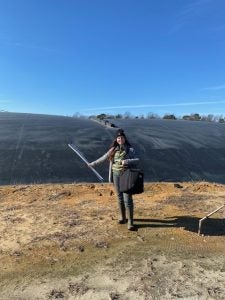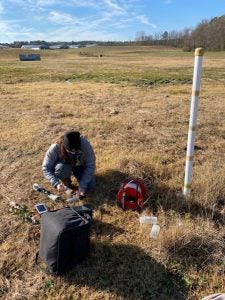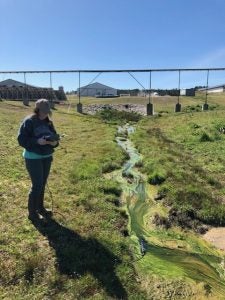 Lauren Richardson, a Tennessee native who completed her undergraduate studies in geology at Appalachian State University is pursuing her Master’s degree in geology at ECU. Like many ECU students, Richardson is passionate about understanding environmental issues and has been working with local agriculture operations as well as ECU staff and students to better understand the relationship between hog farms and water quality.
Lauren Richardson, a Tennessee native who completed her undergraduate studies in geology at Appalachian State University is pursuing her Master’s degree in geology at ECU. Like many ECU students, Richardson is passionate about understanding environmental issues and has been working with local agriculture operations as well as ECU staff and students to better understand the relationship between hog farms and water quality.
Now a passionate and dedicated geology student, Richardson began her undergraduate studies on the pre-law track, “I went to a seminar and they were talking about how that summer the Geology Department was going to Iceland and I said, so if I changed my major to geology I can do things like go to Iceland? And they were like, “yeah exactly”. I changed my major the next day and I went to Iceland that summer with the Department for research”
After coming to ECU for graduate school, Richardson was able to get involved in an interdisciplinary project investigating how new waste handling strategies at hog farms might impact nitrogen releases to rivers in eastern North Carolina. Agriculture is the largest non-point source of nitrogen pollution in North Carolina and contributes to the flourishing of algal blooms in coastal waters, which consume oxygen from surface water bodies after the algae die and begin to decompose – a process known as eutrophication. Richardson is hopeful that her research will help us gain a better understanding of how much industrial hog operations can impact water quality on a local scale and how the development of strategies and technologies might help to limit this particular type of pollution.
 Richardson’s project is just one part of a larger over-arching project which relies on the collaboration of students and staff in various disciplines. While Richardson is a prominent leader in this study, she very clearly acknowledges the importance of teamwork, a concept held in very high regard by ECU staff and students alike. She says that she will often take four to five people with her to her field site where “we split into teams … [to] get data and get samples”. Upon returning back to campus she benefits from being able to analyze her samples at the Environmental Research laboratory in the biology Department to look for different species of nitrogen. Though she is working toward her Masters degree in the Geology program, she is jointly advised by both Dr. Iverson, Assistant Professor of Environmental Health, as well as Dr. Moysey, Professor of Geological Sciences, in addition to receiving help from many faculty and students from multiple areas of ECU. She has greatly appreciated the interdisciplinary team spirit at ECU that is supported by the Water Resources Center.
Richardson’s project is just one part of a larger over-arching project which relies on the collaboration of students and staff in various disciplines. While Richardson is a prominent leader in this study, she very clearly acknowledges the importance of teamwork, a concept held in very high regard by ECU staff and students alike. She says that she will often take four to five people with her to her field site where “we split into teams … [to] get data and get samples”. Upon returning back to campus she benefits from being able to analyze her samples at the Environmental Research laboratory in the biology Department to look for different species of nitrogen. Though she is working toward her Masters degree in the Geology program, she is jointly advised by both Dr. Iverson, Assistant Professor of Environmental Health, as well as Dr. Moysey, Professor of Geological Sciences, in addition to receiving help from many faculty and students from multiple areas of ECU. She has greatly appreciated the interdisciplinary team spirit at ECU that is supported by the Water Resources Center.
 While at ECU Richardson has also benefited by taking part in a lab internship with Water Resources Center, which was organized by Dr. Hoben who is the Center’s Scientist and Research Coordinator. Though her prior research experience as an undergraduate was predominantly in the field, her work in the lab has opened her eyes to chemistry and she is now looking to make a transition into more lab-oriented work. She says, “even though I have a geology undergrad and Masters, I’m hoping for more of a chemistry lab-type job…I don’t think that I would have even known I like chemistry until I did this project …I kind of took a leap of faith doing this”. And that leap of faith paid off. Just one week prior to our interview, Richardson was offered a position as a lab tech working with ECU’s Health Education & Promotion Department to monitor and test for COVID-19 on campus, which she will begin in the spring semester of 2021.
While at ECU Richardson has also benefited by taking part in a lab internship with Water Resources Center, which was organized by Dr. Hoben who is the Center’s Scientist and Research Coordinator. Though her prior research experience as an undergraduate was predominantly in the field, her work in the lab has opened her eyes to chemistry and she is now looking to make a transition into more lab-oriented work. She says, “even though I have a geology undergrad and Masters, I’m hoping for more of a chemistry lab-type job…I don’t think that I would have even known I like chemistry until I did this project …I kind of took a leap of faith doing this”. And that leap of faith paid off. Just one week prior to our interview, Richardson was offered a position as a lab tech working with ECU’s Health Education & Promotion Department to monitor and test for COVID-19 on campus, which she will begin in the spring semester of 2021.
As an experienced student who has successfully earned her Bachelor’s degree and is well on her way to completing her Master’s degree, Richardson offers some words of advice to future students interested in pursuing a graduate degree, “I think [a master’s] degree is really research oriented especially in geology, we take a few classes but the point is to…complete this thesis”! She encourages incoming graduate students learn how to independently solve problems, think critically, and prepare yourself mentally for what is to come. “People don’t really prepare you for how hard it’s [going] to be mentally”, she says, so learning effective time and stress management are important.
Richardson is grateful for her time at ECU and there is no doubt that this Pirate will have a bright future ahead getting wet in the water industry!
Check out our podcast interview with Lauren, to learn more about her research!